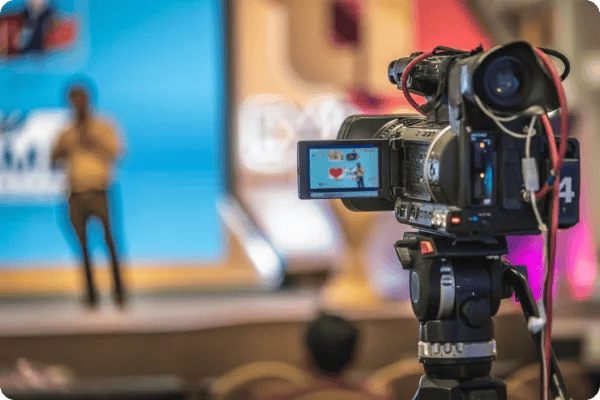Attending a conference, workshop, training, or seminar is the perfect way to gain new knowledge, meet like-minded professionals, expand your skillset, and expose yourself to new perspectives in your field.
However, while you may see the benefits of attending an event, getting the “thumbs up” from management may take a bit of convincing.
Your manager needs to know your justification for attending a conference, plus the costs of travel, lodging, time away from work, and other expenses associated with the event.
The next time you find an event you’d like to attend, consider writing a conference justification letter to get your boss on board with letting you register.
- Want a free conference justification letter template? Fill out the form below.
- Looking for a conference to attend? Check out our list of the best event planning conferences - perfect for meeting planners, event marketers, venue managers, event sustainability enthusiasts, and more!

How to Write a Conference Justification Letter in 7 Steps
Looking for guidance on a justification letter format? Download our free letter of justification template by filling out the form above, or write your own letter of justification from scratch by using the tips below.
1. Research key event details.
Before you begin writing your letter of support for conference attendance, set yourself up for success! Learn as much information about the event as possible. This will help you identify and highlight important information you want your boss to know.
When researching whether to attend a conference, consider the following:
- How many attendees came to the event last year?
- Who typically attends the event? (i.e., Industries, Job Titles, etc.)
- What is included in this year's event agenda?
- Does the schedule include noteworthy keynote speakers to learn from?
- How many breakout sessions, trainings, or seminars are offered?
- Does the conference include business networking opportunities?
It's up to you to articulate the direct and indirect benefits of attending the conference to your employer. In this research phase, you'll gain a better understanding of the knowledge and skills you'll acquire from the event. You'll also get a better idea of the networking and potential business leads opportunities you'll have.
2. Write an event description.
Next, you'll want to work on your justification statement. Once you have determined the event will be a great fit for you, start writing your letter of justification.
Start with a justification statement or "statement of purpose." This will give your manager a solid understanding of the event and why it appeals to you. Keep things simple by copying and pasting a description of the event from their website or social media pages.
Use the following justification statement example:
"Dear [Manager],
I am requesting your approval to attend [Event Name], which will take place in [Location] from [Start Date] to [End Date]. Attending this event could be an excellent opportunity for both my professional growth and the overall success of the [Organization/Department Name] team.
The [Conference Name] brings together [industry] experts, thought leaders, and innovators from around the world. This year's event is particularly exciting, featuring a diverse range of keynote speakers, hands-on workshops, and panel discussions. In past years, [Organization 1] and [Organization 2] have also been in attendance."
In this example, we have highlighted the event's location, dates, and attendance options. We've also noted that this event has a great reputation. Lastly, we've built credibility by noting prominent organizations that plan to attend the conference. Make a point to highlight brands your manager is familiar with, if possible.

3. Explain the benefits of attending the event.
While events are fun, your leadership team is more interested in knowing how your attendance will benefit you and the organization. Not sure what to write? Start with the following list of great examples of how attending a conference is beneficial to all stakeholders involved.
Benefits of Registering for a Conference:
- Find new vendors, suppliers, and business partnerships
- Gain insights into industry trends, best practices, and emerging technologies.
- Meet with exhibitors and vendors for in-person discussions
- Learn best practices from keynote speakers and breakout sessions
- Identify techniques for meeting today’s growing guest demands
- Connect with peers, potential collaborators, and industry leaders
- Enhance your skills and expertise through workshops, seminars, and keynotes
- Demonstrate your commitment to professional growth and staying up-to-date on trends
- Build a stronger professional reputation within your industry or niche
- Spark new ideas and creative solutions for your organization's top challenges
- Strengthen your relationships with colleagues and create a more collaborative culture
How to Write about Event Programming:
Provide your boss with more information on the event's programming, such as keynote speakers, breakout session options, workshop opportunities, expo hall hours, etc. Use the following template to write about event programming at your conference.
"This conference includes a lineup of distinguished speakers, including [Speaker Name], [Speaker Name], and [Speaker Name]. These individuals are at the forefront of our field, and their insights are sure to be invaluable.
I also plan to attend several workshops directly related to our current projects and challenges. These sessions will provide me with practical skills and strategies that can be immediately applied to our work.
Beyond the scheduled sessions, the conference offers numerous networking opportunities. These interactions could lead to potential partnerships, collaborations, or insights that may benefit our company. I look forward to stopping at new booths and identifying new solutions that could benefit our team."
Place emphasis on internal knowledge transfer and problem-solving in your letter. The ideas you learn at the conference can benefit your entire department, if not your organization as a whole. Your participation in the event is valuable, so make it clear that you hope to learn new research, cutting-edge techniques, and insight from thought leaders.

4. Describe how to earn continuing education credits.
For many employees, seeking continuing education (CE) credits or continuing education units (CEU) is a necessary part of remaining competitive in their field of work. Earning CE credits will help you stay at the forefront of industry trends, acquire new skills, grow your career development, and increase your professional competitiveness—especially in a crowded job market.
If the conference offers CEU credits for attending, make this known to your employer. These credits are not just tokens of participation; they are tangible proof of the knowledge and skills gained during the event.
Many regulatory bodies and professional organizations recognize the significance of these credits, often mandating their acquisition for maintaining certifications or licenses. This benefit can greatly improve your chances of securing funding for your event.
How to Write about Earning Continuing Education Credits:
"By participating in sessions and workshops at this event, I will be eligible to earn up to [number] Continuing Education Units (CEUs) as part of my participation. [Conference Name] offers a comprehensive program that has been designed to provide insight on the latest industry insights, best practices, and hands-on training.
These educational components are recognized and accredited by [Accreditation Body]. The credits I'll earn will contribute to my ongoing certification requirements and ensure that I remain current with the latest industry standards and practices."

5. Emphasize event networking opportunities.
Whether your goal is to form new business relationships or develop your career, events are a great place to make interpersonal connections with people in your industry.
In your letter, highlight that attending the event could help you obtain new clients, source better vendors, gain new perspectives, or form successful partnerships with other brands through business networking.
Conferences are the perfect place to build your professional network, attend networking events, and share your physical or digital business card. Let your employer know that you intend to share your perspectives and return with new ones, which you can share with the rest of the team once you return.
Talk about Career Growth Opportunities:
"I am looking to actively engage with a diverse community of industry professionals at [Conference Name]. More specifically, my goal is to connect with potential clients, explore partnerships, source new vendors, and gain fresh perspectives to bring back to the team."

6. Highlight career development opportunities.
Exploring your career interests is important. This is how you discover your personal talents and ensure that your skills align with your values and preferences. Attending industry-related workshops or conferences can help you gain an understanding of what you enjoy most about your field.
Specify Career Development Opportunities:
"Attending the [Conference Name] will let me dive deeper into my career interests and aspirations. I am looking forward to learning more about [Topic 1], [Topic 2], and [Topic 3]. The featured speakers and sessions I attend will help me gain a more comprehensive understanding of these areas."
Your letter can also mention that this event will expose you to new disciplines and research within your industry. This information will improve your professional development and help you reach your career goals. While most conferences revolve around a single topic, chances are that you’ll find the perfect opportunity to explore different sub-fields you may not have known about before.
7. Note ticket pricing, travel expenses, and early-bird discounts for the conference.
The cost of registration is only one part of the overall expense to attend a conference. Be upfront and concise with how much it will cost for you to go to your event, including the cost of food, lodging, airfare, gas mileage, and other expenses. Travel justification can be tricky, but leaning into persuasive writing can help you get that "yes" you're looking for.
Remember to mention any expenses that are included in the cost of your event registration in your letter. For instance, make a note if meals, activities, or any other perks are covered with your ticket purchase.
How to Talk about Event Costs:
"I have assessed the expenses tied to my attendance at the [Conference Name]. The primary costs include the registration fee, travel expenses, and accommodation, which I've outlined below. Please note the following discounts and group rates we can utilize to further minimize expenses."
- Registration Fee: [INSERT COST]
- Airfare/Travel: [INSERT COST]
- Hotel: [INSERT COST]
- Additional Expenses: [INSERT COSTS]
- Discounts: [INSERT SAVINGS]
- Approximate Total: [CALCULATE TOTAL COST]

Get a Free Conference Letter Template
Congratulations! You've officially written your letter to request to attend a conference! We know that convincing your boss may seem nerve-wracking, but our greatest advice is to focus on event ROI and how attending will yield a great return for your organization.
Consider the following when demonstrating the value of a conference:
- Emphasize how the experience will help you expand your skill set as a professional.
- Mention how the relationships you’ll form could lead to new clients, partnerships, and opportunities.
- Note how the event will help you promote the company’s mission and create brand awareness.
- Offer to prepare a presentation or write-up on what you learned to share with colleagues.
With a little persuasive writing, you’ll be on your way toward convincing your manager of the value and rewards you’ll gain from attending your seminar.
If you’re looking for help writing a conference letter, we are here to help. Event planning professionals and attendees alike can use the following letter layout to improve their chances of attending (or creating) a successful event that draws a wide variety of audiences. For event planners, dispersing this template can be integral to your event marketing plan.
Download your justification letter example by filling out the form below.

READ NEXT:



Submit a Comment